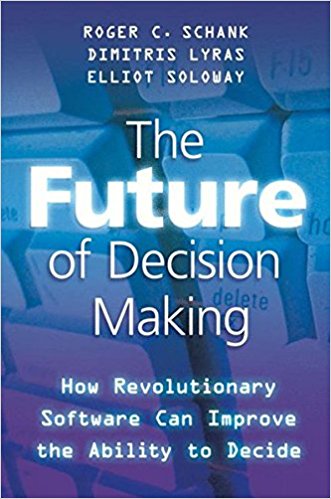The Future of Decision Making Summary
<1 min read ⌚
 How Revolutionary Software Can Improve the Ability to Decide
How Revolutionary Software Can Improve the Ability to Decide
Proficient decision-makers don’t follow the rules or logic; they follow their intuition.
We summarize how to join the decision-making club and rule the world.
Who Should Read “The Future of Decision Making”? And Why?
You as anybody else must seriously reconsider your tactic for arriving at a conclusion; it’s not a straightforward matter, but sure is worthy of your time and energy to explore it. On the positive side, all of us share the same intuitive powers, all you need to do is awake that inner beast from within!!
In other words, this thesis illustrates that our accumulated experience represents a training ground for making the right calls. For instance, when an issue presents itself, what is the first thing that you absorb? Probably, something related to your past, a similar occasion that acts as an evaluation indicator for making the right call.
You have to realize that new options exist, these are not a part of your expertise or experience, but you mustn’t so quickly disregard them. If we consider all points, this book is a perfect fit for any person striving to become a leader or someone who already is, but wishes to expands his/her field of knowledge further.
About Roger C. Schank, Dimitris Lyras & Elliot Soloway
 Roger C. Schank is an American-born intelligence theorist, scientist, psychologist, businessman, author and a professor teaching at Northwestern University. He was born in 1946.
Roger C. Schank is an American-born intelligence theorist, scientist, psychologist, businessman, author and a professor teaching at Northwestern University. He was born in 1946.
Dimitris Lyras is the founder of a software consultancy firm called – Ulysses-Systems.
Elliot Soloway is an author and works as a professor at the University of Michigan. He teaches subjects related to engineering.
“The Future of Decision Making Summary”
Running an organization is all about making the right calls. Support is critical in this process, but without the expertise, it would be like a ship on dry land. Make your presence felt among the co-workers; trust is also vital.
Companies seek a competitive edge, and that it’s a part of the economic survival. The marketplace is ruthless, so the priority must fall on the decision-making. From the beginning of time, organizations of all kinds struggled to maintain flexibility and effectiveness.
As the society progressed through ages, these so-called modern or ancient institutions moved forward amicably with the same intensity and pace as time. However, to some extent, this wasn’t enough.
Over and over again, leaders and managers, stimulate team cohesion and disregard individual skills (not entirely). In general, companies are more concerned with the economic fluctuations and whether the company is going in the right direction.
Improving the services that an organization has to offer, often comes secondary. The human factor is prone to mistakes, so you cannot eliminate the element of error, but you sure can reduce it. The entry point consists of highly qualified staff, with excellent managerial characteristics and abilities.
The process of building relationship with your target audience relies on the same principles, so in fact, you’ve got nothing to lose. Good decisions emerge as a consequence of excellent preparation and knowledge.
Nothing falls of the sky, you must make your way through the competition, in order to find prosperity on the other side. This valuable piece of advice, unlike other things, come free as air, make use of it, and start building an amazing portfolio of decisions.
Bad calls may occur on several occasions, first – a company is not familiar with the environment, second – the company lacks professionalism, and third – reliance on logic and ground rules.
The old-fashioned approach deriving from a single person, lacking diverse opinions is like signing a “death-sentence” from an expert’s point of view. Adopting a flexible attitude is more likely to cope with the shaky economy that prevails today.
Eliminate all of the logical assumptions and start focusing on “modern-wisdom”. The previously mentioned, conventional approach can prove useful only when the information is available full-time. Usually, that’s not the case. Perhaps, admitting momentary defeat and conducting reforms within your organization is the biggest victory.
The finest method covers a wide range of aspects. Indeed, it’s a lot easier if a manager uses its “half-baked logic” rather than considering dozens conflicting factors and then making the call. In either case, you must understand, that rational thinking and logic are contradicting “The Future of Decision Making”.
The authors provide the audience with a first-hand tool for improving your business operations. For this purpose, Roger, Dimitris, and Elliot share a set of well-written and explained methods linked to the proficiency of decision-making.
Although some of the aspects may be a bit confusing, numerous examples are there to help you absorb the material even quicker. According to the people who have read it, this is a first-class book that applies to all industries.
We warmly suggest and recommends it to all global (local) leaders, managers, software designers and experts in other areas.
Key Lessons from “The Future of Decision Making”
1. Patience is crucial during the decision-making process
2. Train the people to make the right call
3. Choosing the perfect decision-making software
Patience is crucial during the decision-making process
The decision-making is a time-consuming process; you have to be patient; an instant shift can cause distress among the employees.
Nevertheless, you should also be aware that having the final word, doesn’t always correlate with respect.
Rationality comes as a heavy burden; it must be eradicated immediately.
Train the people to make the right call
Sometimes, managers must sidestep their conventional approach, and learn more about the new way.
Many principles are present nowadays, that can improve the decision-making in any organization.
However, quite often this is not seen as useful practice, but as unnecessary thing due to various reasons.
Choosing the perfect decision-making software
Softwares play a pivotal role in any activity because in either case, they are filled with tons of useful information.
Organizations seek to find the best one, with the best data retrieval, so that the management can easily manipulate with the info.
Like this summary? We’d Like to invite you to download our free 12 min app, for more amazing summaries and audiobooks.
“The Future of Decision Making” Quotes
Designing usable software for decision makers isn’t rocket science; it’s brain science. Share on X Emotion can serve decision makers well. Share on X Most of the email systems used in organizations are not as smart as even the slowest-witted, most inexperienced secretary. Share on X Some of the most interesting and instructive stories an expert can tell are related to mistakes he has made. Share on X Organizations loathe the idea of failure, but failure is integral to on-the-job learning. Share on XOur Critical Review
The authors of “The Future of Decision Making” have done a great job by explaining why people pass judgments based on assumption.
Emir is the Head of Marketing at 12min. In his spare time, he loves to meditate and play soccer.


 How Revolutionary Software Can Improve the Ability to Decide
How Revolutionary Software Can Improve the Ability to Decide




